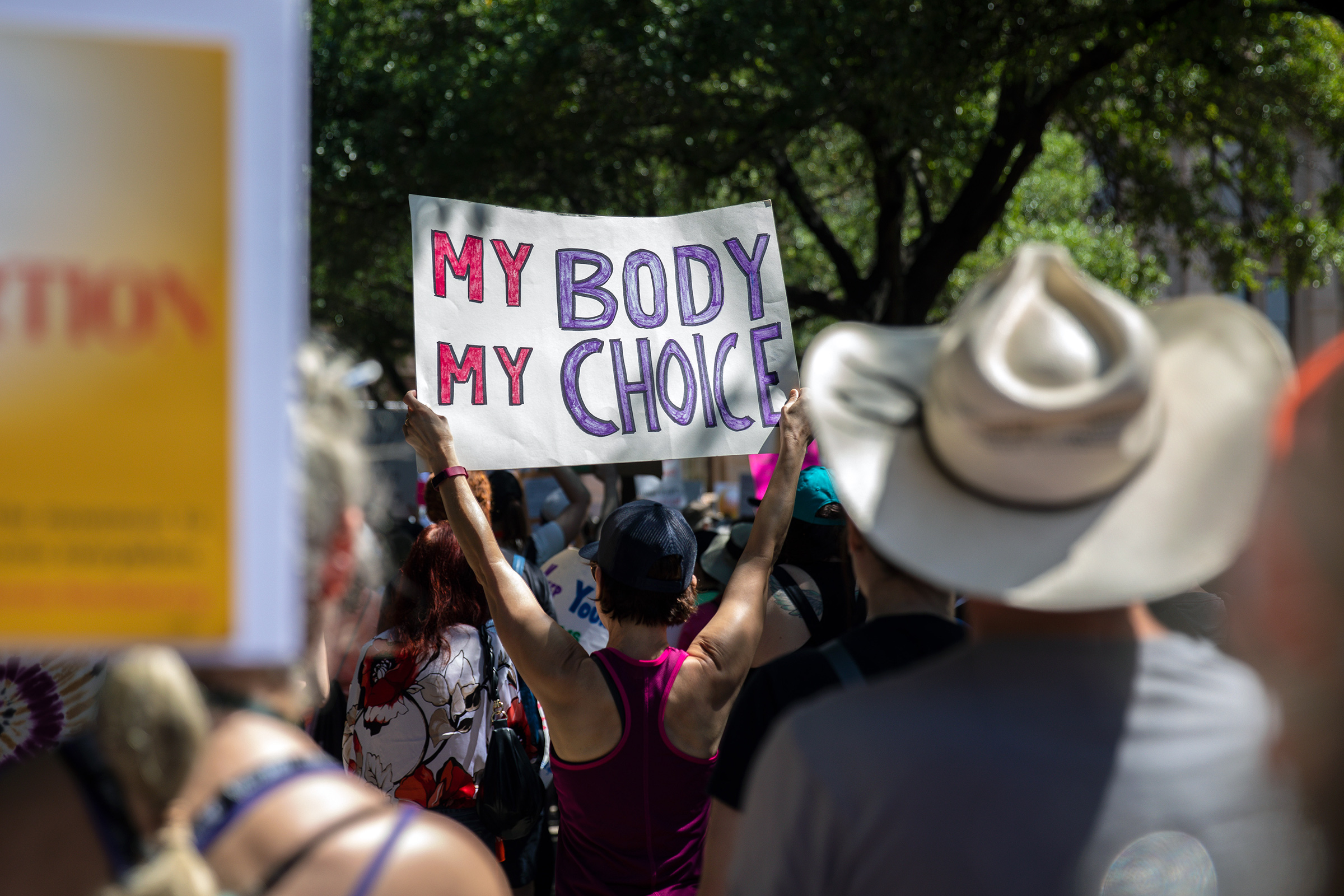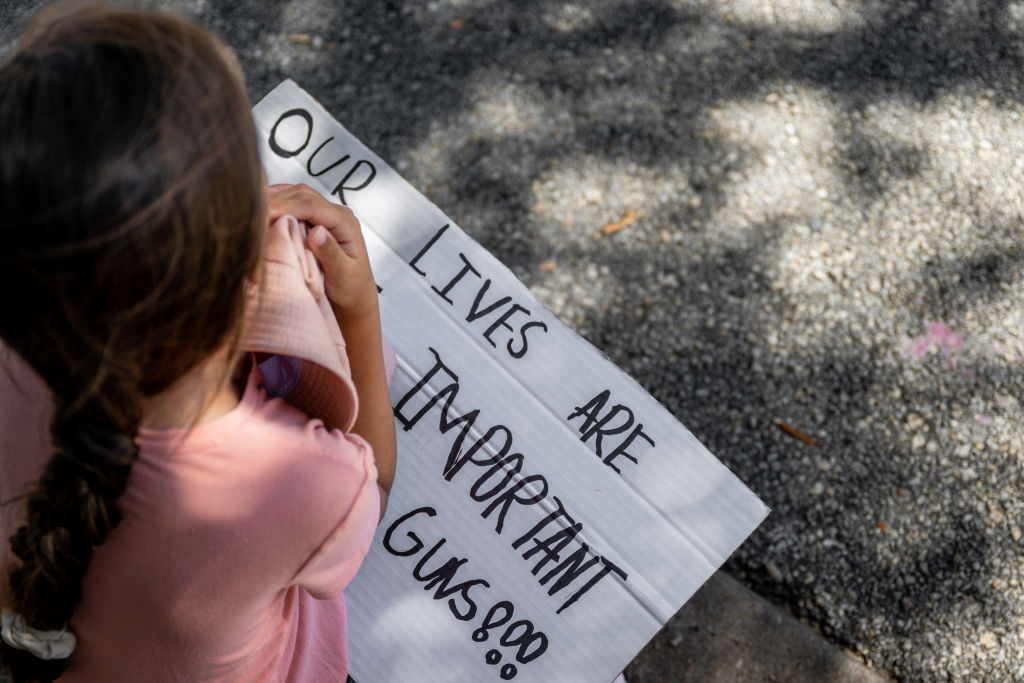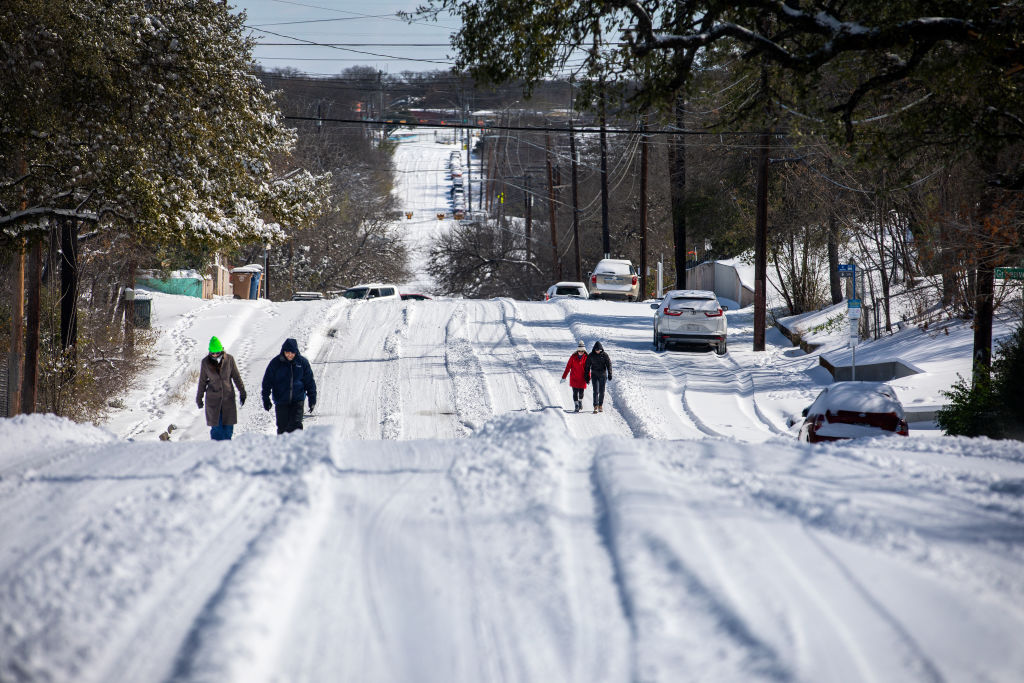
In the grocery store, in H-E-B, a strange, angry paranoia overtook me. Suddenly, I couldn’t look at any of the faces that passed me without my heart clenching. The produce blurred fluorescent around me, the piles of apples and pears looked so fake as to be plastic.
It was a Sunday, two days after Roe v. Wade was overturned, and in Texas, reproductive-care centers had stopped abortions entirely. I’ve been a single-issue voter for my entire life, and that issue is not forcing people to give birth against their will.
I’ll spare you the story of my own abortion at 25 — I don’t owe that to anyone. Too often, we fall back on telling our own emotional stories about our abortions or explaining the necessity of ectopic pregnancies to defend our right to choose. We all deserve access to abortion, no matter the circumstances.
When I first moved to Austin for a job three years ago, I fell in love: the casual vibe, the nature, the big blue sky. I remember feeling as if I had never seen so much sky in my life. Even now, the sunsets are beautiful enough to make me pause.
I’d moved from San Francisco via Philadelphia, two cities with their own versions of frantic energy that felt electric and nonstop. Austin was a place where everything slowed down. The whole city felt as if it were on a permanent vacation. People stopped me and asked how my day was going.
The other reasons I fell in love: the writing community, everyone at BookPeople and Malvern Books, poetry readings on my friends’ front porches, tacos at Quickie Pickie, tubing down the river, hikes around Lady Bird Lake with my dog, intimate concerts like Jenny Lewis playing to 200 of us at Scoot Inn, Phoebe Bridgers at Stubbs, Chelsea Wolfe beneath the dappled stained glass of the small chapel inside the Presbyterian Church.
I built a life here. And at first, it felt like magic.
But after Roe was overruled and a 1925 abortion ban went into effect in Texas, I knew I was going to leave. And it wasn’t only because of Roe.
Roe was just the final straw.
The party line about Austin is that it is the liberal bubble that is one of the saving graces of Texas. “Oh, Austin? That’s the blueberry in the cherry pie!” a co-worker said to me before I moved south. “You’ll be fine there.”
But on the way to the grocery store that Sunday, I passed three different trucks with LET’S GO BRANDON bumper stickers. And that right-wing anti-Joe Biden catchphrase kept running through my mind as I shopped. My paranoia grew. Every man who walked past me in the produce section felt more menacing. A question kept flashing through my mind: How many of you think I should be forced to have your child?
In Travis County, which counts Austin within its boundaries, roughly 72% of voters went for Biden in 2020. At first glance, that’s not too bad. But dig a little deeper, and the numbers aren’t so reassuring. In Philadelphia, about 81% chose Biden. In San Francisco, the number was even higher, around 85%.
Read More: The Devastating Implications of Overturning Roe Will Go Far Beyond Abortion Patients
A difference of 10% to 15% in votes is not insignificant. Then factor in the pandemic, which sent the number of people moving to Austin through the roof. In the three years I’ve lived here, the average price of a home increased nearly 68% above the historic trend line, a three-decade high.
Certainly, cost of living is shifting the demographic. According to Axios, Austin is the most desirable place for young Republicans to move in 2022. Joe Rogan and Elon Musk both moved here and loudly encouraged their fans, followers, and employees to do the same. It feels increasingly difficult to rely on the 2020 election as an indicator of how liberal Austin is — let alone whether the city being liberal can ever overtake the relentless underlying Republicanism of the state itself.
Even if you’re in Austin, even if Austin is liberal, you’re still in Texas.
My friend, a nonbinary trans woman who lives down the street, has a common refrain: “This state is trying to kill me.”
In the grocery store, as the men walked around me, buying bagged salads, their faces smearing into blurs, I thought of my own dating history in Austin.
In the last year, I’d started having 30-minute screening calls before I went on dates with anyone from the apps. A disturbing trend had begun: I’d go to dinner with a man who was seemingly liberal — only to find out before we finished our first round of drinks that he was anti-vax, pro-Joe Rogan, and “doing his own research on who really did 9/11.”
It hadn’t always been this way. What had been billed as a liberal haven of art, music, and weirdos — and most of the weirdos were long gone — had become something else: an increasingly expensive city caught in a fraught deadlock with the state.
Read More: Why I Stay in Texas, Even Though It’s Breaking My Heart
There were other problems: Austin’s dependence on Texas’ unreliable electric grid, the traumatic week of our terrible winter storm, the threat of rolling blackouts on 100-degree days to conserve energy, the continued struggle the city has when it comes to supporting the unhoused, the number of times I’ve watched random men casually carrying assault rifles around town, the easy access to guns resulting in mass shootings like we saw in Uvalde, the surge of anti-LGBTQ bills.

Advocates are pushing for political change by trying to get liberal candidates like Beto O’Rourke elected. And I hope he wins. But after years of gerrymandering and Governor Greg Abbott’s absolute drive to remain in power, I have slim hope.
Even if O’Rourke does win, he still has a majority Republican state legislature to deal with. And they have shown us, time and time again, that they will stop at nothing to get their agenda through. Whether the GOP is attempting to loosen gun restrictions or spurring investigations into the families of trans kids, we underestimate the Republicans in Texas at our own peril.
It is impossible to talk about reproductive rights without talking about race and class. The people who will be most hurt by Roe being overturned are the most marginalized: people of color and people without money.
I’m a white woman with a good job and, for the first time in my life, the means to pick up and move to Los Angeles in a few weeks. I’m privileged enough to leave. I’d be privileged enough to afford to get on a plane and travel for an abortion if I were to stay.
California is actively fighting to safeguard abortion access in the state, but as in every state in America, people of color and those in poverty still struggle to access reproductive health care at the same rates as wealthier, white people.
In Texas, a state that already ranks among the worst in the nation for racial health disparities, Hispanic and Black people will be the most impacted by lack of access to reproductive health care, just as they were hardest hit by COVID-19.
Read More: I’m a Doctor Who Cares for Newborns. I’m Nervous After the End of Roe
But then, Texas has failed people of color in so many ways. People of color made up 95% of the state’s overall growth in population over the last decade, according to the 2020 U.S. Census. The state immediately redistricted its congressional map this year so there would be fewer districts in which people of color held a majority. Politico called the new map a “big boost for the GOP.”
One argument for staying in a place like Austin is to vote and advocate for the rights of those most affected, those who cannot leave. I believed in that, too.
Now I believe differently. During the terrifying winter storm here, the power grid went down, leaving so many Texans stranded in frigid temperatures without access to heat, food, or water. In the absence of government help, mutual-aid organizations began fielding donations and putting unhoused people and those in need at hotels. I worked with Austin Bat Cave on their food and supply drive in order to distribute food, clothing, and water. Alongside other community organizations, we took care of the people our government abandoned. In the end, 246 people died in that storm.
The refrain We take care of us is often used in the mutual-aid community, and it’s something I have been thinking about when it comes to abortion. Days after Roe was overturned, President Biden took to the podium to tell us “Roe is on the ballot this November.”
As if we haven’t already been voting. As if we can wait.
Read More: As Texas Targets Trans Youth, a Family Leaves in Search of a Better Future
When people suggest I should stay and vote, it implies our broken systems will save us. It suggests that racial gerrymandering doesn’t exist and ignores the fact that our current Supreme Court seems inclined to accept it. It suggests that the latest congressional districting map of Texas hasn’t already set the stage for a Republican win by reducing the worth of votes from liberals, women, and people of color.
The systems in place were not designed to help the marginalized and the poor, especially in Texas. And they won’t be what helps them immediately.
It’s no longer enough to vote. Local abortion funds are a direct avenue to help people access reproductive care outside of the government, and those of us with privilege have a responsibility to devote our money and time. Leaving doesn’t mean I will stop donating to organizations that can assist those who need it most, right now, today, who can’t wait until November.
There, in the grocery store, it all flashed through my mind: Let’s Go Brandon, 72% of voters, the power going out again, boiling water to drink for days during the winter storm then running out of food for my dog, the way the parents I worked with looked during our meetings after the Uvalde shooting, the men on dates saying I’m doing my own research, the clinics halting abortions, the number of people in the state who would be forced to give birth, the estimated 37% of Texans who own guns, This state wants me dead.
Before the overturning of Roe v. Wade, I liked to tell myself I was partially moving to Austin to help flip Texas. Even after SB8, a law banning most abortions after six weeks that went in effect last year, I thought my vote could do some good. I thought anyone with the privilege to leave who left and didn’t fight was rotten.
But there is a difference between the hypothetical and the reality.

People don’t move to or stay in a city or state in order to vote in a way that helps other people. They move or stay for economic reasons, for their families, for better education, for jobs. And now they will move for their rights. People will move to Texas because they agree with these laws, just as people will leave because they do not.
Read More: I Refuse to Give Up Hope After Roe
Two of my friends were already relocated out of Texas by their jobs after the decision to overturn Roe was leaked. A married friend who wants a second child with her husband is selling her house to leave because she doesn’t want to risk a complicated pregnancy here. The parents I know are leaving because they are terrified when they send their children to school — it’s hard to imagine asking them to stay and fight. My transgender friends talk about leaving, too – and I want them to. I want them to live.
The stay and fight line of thinking is another way of reducing the body to politics. It suggests that as a single woman, I should stay in a state in which lawmakers continually try to criminalize abortion, opening up the possibility that a person who gets or performs one might face charges that could carry the death penalty.
To stay and fight implies I should either stop having sex altogether, hope my birth control doesn’t fail, or simply pray I never get pregnant. Ultimately, telling someone to stay and fight in Texas is another way of denying them a choice. It’s another way of forcing someone into the same tragic, untenable situation we relied on Roe to protect us from for all of these years.
More Must-Reads from TIME
- Cybersecurity Experts Are Sounding the Alarm on DOGE
- Meet the 2025 Women of the Year
- The Harsh Truth About Disability Inclusion
- Why Do More Young Adults Have Cancer?
- Colman Domingo Leads With Radical Love
- How to Get Better at Doing Things Alone
- Michelle Zauner Stares Down the Darkness
Contact us at letters@time.com